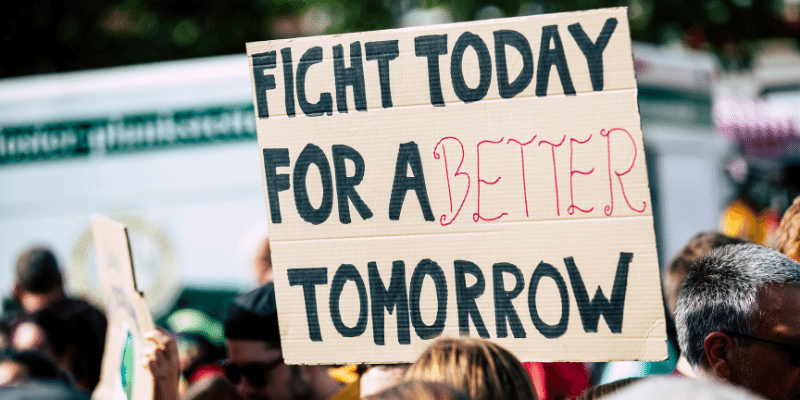If you care about climate breakdown
You should care about plastics
More than once I’ve heard people say that climate breakdown is a much bigger issue than plastic pollution.
Or that plastic pollution is a distraction from the wider environmental crisis we face. Add to this a recent BBC interview with George Monbiot in which he slammed switching your cotton buds as ‘pathetic micro-consumerist bollocks’, and I’ve got myself a case for defending plastic pollution’s place at the table of environmental collapse. Sounds like a dinner party to die for.
In his defence, George was referring to the problem of trying to solve rampant consumerism with more consumerism. And we did have a particularly fun moment when I challenged him on it on stage recently at an event. As the founder of City to Sea, the organisation behind the #SwitchtheStick campaign (which successfully got all UK supermarkets to stop making cotton buds out of plastic and switch to paper instead) I felt the need to call him out on that one.
And it’s a case in point, stopping over 400 tonnes of non-recyclable plastic, which would have most likely ended up being flushed and making its way into the UK’s rivers and seas, isn’t micro-consumerist bollocks. It’s a big reduction in fossil-fuel based plastic that sent a strong message to not just the supermarkets, but the plastic industry itself, that us ‘consumers’ don’t want 275,000 tonnes of currently non-recyclable plastic a year covering our cosmetic products, food, or anything else. And beyond that, it challenged investor’s assumptions that the plastic industry is a good bet. Pathetic micro-consumerist bollocks? More like awesome macro-systemic transformation. (I thought I made that word up, but apparently, it already exists.)
Refuse single-use
Challenging industry assumptions of the infinite growth of demand for plastic – a plastics boom even – is exactly what we’re doing every time we as individuals refuse single-use plastic. And challenge them we must, as over 99% of plastic is made from fossil fuels, and most of us are now well aware that we need to keep that stuff firmly in the ground if we’re to have any chance of avoiding the worst consequences from climate breakdown.
According to one study, this means leaving at least 80 percent of the world’s known remaining fossil fuel reserves in the ground, which includes more than 90 percent of U.S. coal reserves and all 100% of Arctic oil and gas. We cannot meet these goals without kicking our global plastics habit. And here’s why.
Currently, plastic manufacturing is estimated to use 8 percent of yearly global oil production. It doesn’t sound like much does it? Yet the plastic produced from this, or our lack of effective waste management systems, has been enough to wreak utter destruction on marine ecosystems, killing hundreds of thousands of marine mammals, entangling countless others and poisoning our food chain. There are unseen consequences too; degrading plastics on beaches are releasing methane (a greenhouse gas 84 times more potent than CO2) and a new study shows that microplastics in the ocean could be disrupting natural carbon storage.
Despite this catastrophe, plastic’s share of global oil use is set to triple by 2050, increasing greenhouse gas emissions from petrochemicals by 30 percent and doubling plastic pollution in our oceans.

The Problem with plastic
If the plastic industry has its way, rising plastic production will account for 15% of global greenhouse gas emissions by 2050. That’s about the same as the entire current emissions of the transportation industry – planes, trains, cars, buses and all.
And the industry push is powerful – currently, over $200 billion is being invested in factories, pipelines, and other infrastructure in the U.S. that will rely on shale gas (from fracking) to supply feedstock to the plastic industry. The need for us to push back is real, and it’s urgent.
Yet for such a big and ruthless force, they have a major weak spot; they need us more than we need them. They need us to keep buying plastic, they need our governments to keep subsidising them, and they need investors to keep investing in them.
You can stop buying single-use plastic. You can join a movement like School Strike for Climate or Extinction Rebellion and get your government to subsidise mass ecological restoration and renewable energy instead of fossil fuels. And you can make sure your current account provider, investments or pension funds are not funding the plastic industry.
there is no planet b
Plastic bag bans all around the world, the new EU single-use plastics directive, bans on straws, polystyrene and yes, even the plastic cotton bud, are a red flag to investors that the plastic industry is at risk – that maybe the boom they were hoping to make a buck out of is as dead in the water as the marine life they might one day have gone snorkelling with, had they not ruined it.
So keep on signing petitions, sharing your zero-waste, plastic-free photos on Instagram, keep on creating a trend for a reusable, buy-less lifestyle and keep on refilling those water bottles. You’re creating a new story, and the more people that buy into it the less attractive the old one becomes … and, a bit like smoking, we quickly realise it really wasn’t that attractive anyway. “Remember the days we used to walk around carrying planet-polluting bottles and sipping coffee out of plastic-lined cups with virgin plastic lids? What were we thinking?”
It’s time to broaden our perspective on plastic pollution and shift the focus away from its effects towards its cause. Yes, we still need to share photos of majestic, endangered species dying from ingesting plastic, and we also need to be talking about consumerism, capitalism and climate breakdown. Plastic pollution is a symptom not just of a broken waste system, but of a broken society, and it’s in all of our interests to fix it as soon as is humanly possible.

